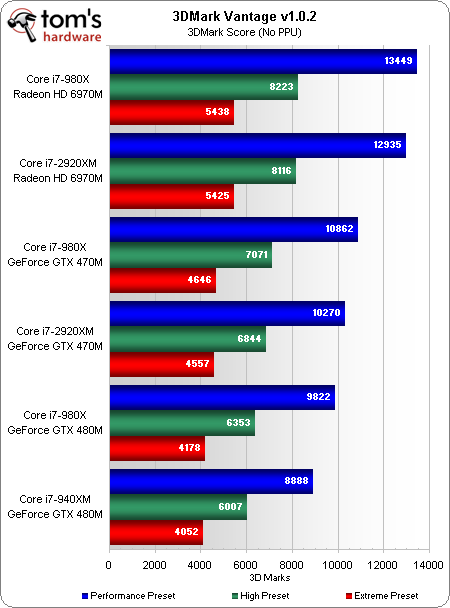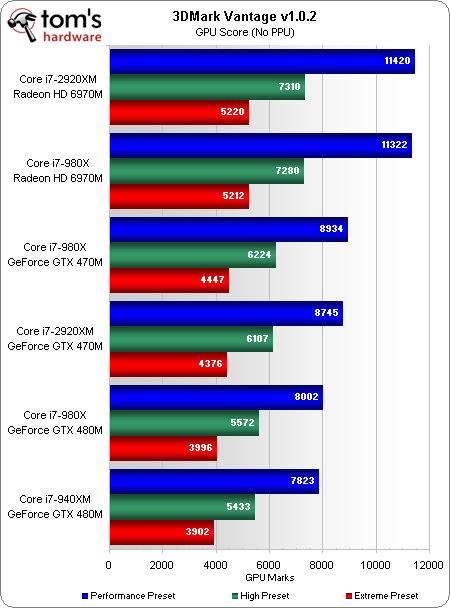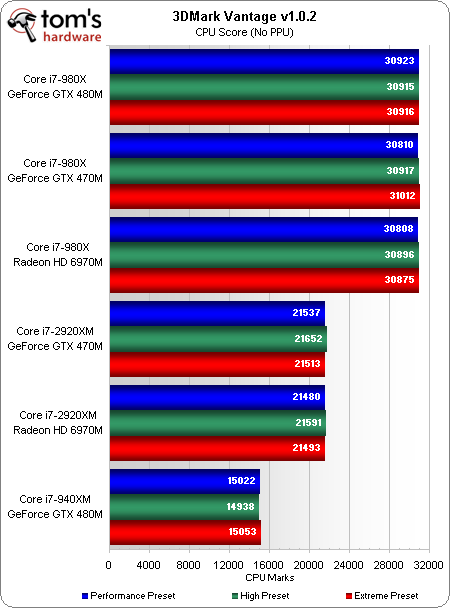Mobile Gaming: Can Core i7-2920XM Beat Desktop Core i7-980X?
We've already seen Intel's Sandy Bridge architecture offer compelling performance gains on the desktop. But can the fastest second-gen Core i7 beat Intel's 130 W desktop-oriented six-core Core i7-980X in games? We set up a couple systems to find out.
Benchmark Results: 3DMark Vantage
Because the i7-940XM notebook was returned before we could attempt to upgrade its graphics card, our 3D performance discussions will be limited to the Core i7-980X versus i7-2920XM. We included statistics from a similar-vintage Core i7-980X plus GeForce GTX 480M configuration to assist anyone who wants to try figuring out where the i7-940XM might place in today’s charts.
Differences that shrink as resolution is increased usually represent a CPU bottleneck. Let’s see how 3DMark rates each GPU on its own.
The Core i7-2920XM comes out ahead of the equally-configured Core i7-980X in 3DMark’s GPU score. But let’s see where its CPU places.
Unlike most games, 3DMark rewards additional CPU cores with higher performance numbers.
Get Tom's Hardware's best news and in-depth reviews, straight to your inbox.
Current page: Benchmark Results: 3DMark Vantage
Prev Page Benchmark Results: Productivity Next Page Benchmark Results: Call Of Duty: Modern Warfare 2-
rohitbaran I don't see the point of comparing high end CPUs, when usually GPUs are the limiting factor.Reply -
porksmuggler I lost count of how many times you wrote desktop. Oh wait, it doesn't matter since you're writing about an i7-980X with a 6970M, which notebook is that by the way?Reply
Since the 6970M is slower than a desktop 6850, what's the point in even mentioning desktops? Who would pair a $1000 i7-980X with $160 desktop graphics card for gaming? -
agnickolov What I don't see here is the desktop Core i7 2600(K). It's clocked at 3.4 GHz stock and should be the real target for comparing mobile to desktop CPUs.Reply -
Immoral Medic Can you really compare the Sandy Bridge with this older i7? I don't think so. I mean, the $330 2600k beats it. No news here.Reply -
Crashman porksmugglerI lost count of how many times you wrote desktop. Oh wait, it doesn't matter since you're writing about an i7-980X with a 6970M, which notebook is that by the way?Since the 6970M is slower than a desktop 6850, what's the point in even mentioning desktops? Who would pair a $1000 i7-980X with $160 desktop graphics card for gaming?It's the Clevo X7200 that holds the DESKTOP Extreme Edition i7-980X. What this means is that today's notebooks beat LGA-1366. If you wanted a notebook but didn't think they had the CPU performance for you, you no longer have an excuse.Reply
agnickolovWhat I don't see here is the desktop Core i7 2600(K). It's clocked at 3.4 GHz stock and should be the real target for comparing mobile to desktop CPUs.Show me a notebook that accepts the Core i7-2600K please, so I can mount a 6970M on it and find out how it compares to this notebook CPU.immoral medicCan you really compare the Sandy Bridge with this older i7? I don't think so. I mean, the $330 2600k beats it. No news here.You must mean $1000 (Core i7-980X), since you can't get a 2600k in a notebook. This article compares the previous-fastest notebook configuration, Clevo's desktop-CPU X7200 "mobile workstation" using Intel's fastest LGA-1366 part, with the fastest new solution. If you don't think that this is a huge leap forward in mobile performance, I can't change your perspective.
-
mattmock Even if I switched to a notebook, I would still need a separate monitor and keyboard set up. The superior ergonomics and screen size are a necessity for serious work. I would be far more likely to do a Desktop and netbook combo to get the best of both worlds.Reply -
Maziar Great article.Reply
SB mobile CPUs perform quite good and sometimes as fast as their desktop counterparts which is good because the first gen core "i" laptop CPUs(such as i7 720QM etc) didn't perform anywhere close as the desktop ones.
-
ta152h After reading only the first page, there was enough there that stopped me from even reading the rest.Reply
First of all, Sandy Bridge is not evolutionary. The pipelines were remade from the ground up, and it's (outside of the P4 family) the first real departure from the Pentium Pro. It borrows a lot from the Pentium Pro family, and the Pentium 4 family. It's not just an evolution of the Pentium Pro based Nehalem. It's probably closer to the Pentium 4 in more ways than not, at least at a low level (PRF, new version of trace cache, etc...).
Second, the desktop is not going anywhere, and sensationalizing won't change it. That's like saying I can get a small car with more horsepower than a big one, so all big ones will be obsolete, especially since the small use uses less power to do the same thing.
Desktops will remain not because of performance, which at any rate will always be superior (compare an i7 2600K overclocked to a mobile processor, which can not be overclocked as extensively), but because the form factor is superior situationally. Both will remain, because both are situationally superior. There have always, or almost always, been notebooks with superior performance to what the average desktop is using, but people buy desktops anyway.
There are inherent advantages that are inalienable in desktops. You can't have a huge screen with a notebook. The keyboard has less flexibility as well. They have less flexibility with upgrades.
On top of this, the idea of a larger, better cooled, more reliable unit that is not easily removed, and is less expensive is pretty popular with businesses in a lot of situations. It's also cheaper to work on desktops, and they are more reliable to boot.
Performance is just one advantage desktops have, and if there's a blip where they don't because of some bizarre marketing by a company (it could happen, it just hasn't yet), that wouldn't make desktops extinct. Notebooks become a lot slower than desktops wouldn't make them extinct either. Most businesses and people can be quite happy with the performance of virtually any computer made (with the possible situational exception of the Atom), but that's not why most people buy desktops.
Also, any student of computer history would tell you that the past was littered with laptops that were FASTER than desktops. How about the original Compaq compared to the PC? The PS/2 Model P70 used the same 20 MHz processor as the desktop models (granted, it came with an amber screen, but could just as easily be attached to a monitor).
So, I wouldn't worry too much about desktops going away. You're dead wrong on that issue, as has everyone else who's been predicting it for the past 20 years. And dead we will both be before there are no more desktop computers. Notebooks, on the other hand, might become extinct, or nearly so, but not anytime soon. Tablets could destroy them, and render them obsolete, if speech recognition software ever makes the keyboard a lot less useful. But, even then, there are situations where you can't talk to your computer (too much noise, or you'd be creating too much noise), so even then I think, at worst, notebooks will become less popular, but not completely extinct. Each form factor has pluses and minuses, and with so many people in the world, there will be plenty for each one. -
rohantheneo XXXXXX All those who did comment here doesn't have any knowledge about the notebooks being offered with Core i7-980X. Don't comment if your knowledge is not updated. Also FYI, the point of this review was that there is Clevo and some other brands offering i7-980X and other older generations desktop i7's in laptop..but in the near future i7-2920XM will be available at laptop i7 price..So how logical it is to go for extreme older gen i7's if SB-Mobile is satisfying all your needs! (And just so you know, it will take a lot of time for Desktop SB i7's to come into gaming notebooks by Clevo or any other brand.)Reply
Edited for bad language ...
/washes mouth out with soap !!
:) -
porksmuggler CrashmanWhat this means is that today's notebooks beat LGA-1366 notebooks. If you wanted a notebook but didn't think they had the GPU performance for you, you still have an excuse.Reply
Since the title of your article is Mobile Gaming, and we know the bottleneck for gaming isn't the CPU...



